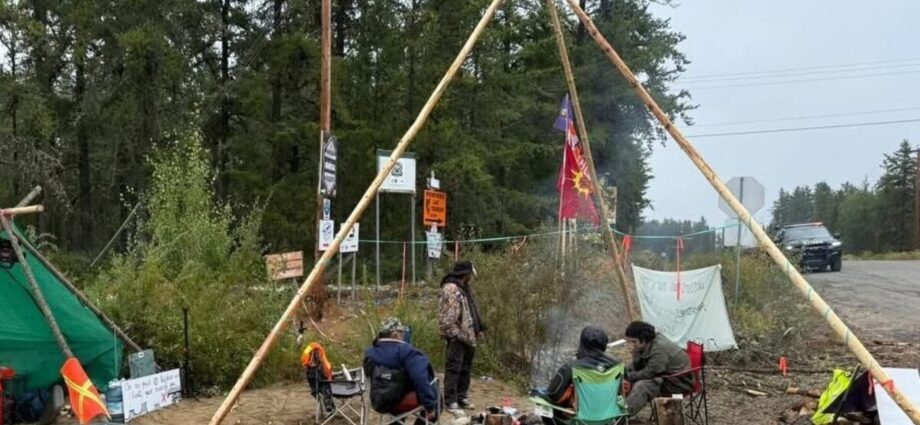
By Raven Katsit’siio Edwards Brown, Local Journalism Initiative Reporter, The Eastern Door
August 29, 2025
Quebec’s proposed Bill 97, which would see complete reform of how forests are managed, has ignited a wave of opposition from First Nations leaders, environmental advocates, and community groups.
Critics say the legislation undermines treaty rights, promotes land privatization, and lacks meaningful Indigenous inclusion sparking walkouts, protests, and calls for a complete legislative overhaul.
Earlier in the summer, the Assembly of First Nations Québec-Labrador (AFNQL) formally withdrew from the government’s high-level consultation table, citing a lack of commitment to a legitimate, co-constructed process.
In a press release, the AFNQL’s described the suspension as necessary after the Quebec government, despite public statements of openness, refused to commit to three non-negotiable principles: Respect for ancestral and treaty rights under the Canadian Constitution and UNDRIP; true co-management of forests on a government-to-government basis; and full withdrawal of the bill’s proposed priority forest management zoning, which they say paves the way for land privatization.
“These principles are neither ideological nor symbolic. They represent the minimum legal standards required for a credible process,” the AFNQL wrote.
Though Mohawk Council of Kahnawake (MCK) grand chief Cody Diabo is still reviewing the full details of the bill, he underscored a key issue: the province’s approach to jurisdiction. “Consultation has to begin at the forefront, not after the law is already written. That’s not partnership,” he said.
He had met with Quebec’s attorney general Simon Jolin-Barrette earlier this week to discuss other political matters and said he was left unimpressed with the province’s current attitude to First Nations’ sovereignty.
“The analogy I gave to the attorney general was simple. When they make laws, would they ever impose them on the United States? Definitely not,” Diabo said. “So why do they think they can do that to Indigenous land?”
Despite initially joining discussions in good faith, Indigenous leaders say they were blindsided by the April 23 tabling of Bill 97, which they argue was developed without their input.
Francis Verreault-Paul, who heads the AFNQL, called the bill “surprising and disappointing,” noting it dismisses First Nations knowledge that blends scientific and traditional ecological wisdom.
Bill 97 introduces a tri-zone model for forest use conservation, multi-use, and industrial development allocating at least 30 percent of forests to “priority zones” for logging.
Indigenous leaders and environmental groups alike argue this structure prioritizes industrial access and undermines biodiversity.
Even the language of the bill has raised alarms. It restricts Indigenous forest use to “domestic, ritual or social activities” a framework the AFNQL slammed as outdated and colonial, ignoring the full scope of Indigenous governance and stewardship.
On the ground, tensions have spilled into action. Peaceful encampments and blockades described by organizers as “sovereignty exercises” have appeared across northern Quebec. One such encampment, attended by Indigenous land defenders and allies, became a flashpoint after a forestry truck pushed into protestors standing peacefully in front of police.
“It was very welcoming, no confrontation, no blocking of trucks,” said land defender Al Harrington, who joined the protest. “But a forestry truck pushed land defenders in front of police officers, and they weren’t arrested.”
In an emailed statement, Quebec’s minister of Indigenous affairs Ian Lafrenière said that the province is pursuing dialogue with the AFNQL “in order to find sustainable and respectful solutions.”
“Bill 97 must evolve, and we are already working to integrate stronger consultation mechanisms, benefit-sharing, and greater predictability for everyone,” he said.

“I understand the concerns that have been raised, but putting an end to all forestry activity is simply not realistic. However, we share a common responsibility to improve the forestry regime and to take into account the rights of First Nations.”
Diabo said that MCK is ready to assert its sovereignty.
“Our concern is always jurisdiction. We’ve fought back against past attempts to enforce provincial environmental laws on our territory. If Bill 97 opens that door again, we’ll be ready.
“We’ve worked well with AFNQL in the past, and we’re continuing to talk and plan. It’s important we move forward as a united front,” Diabo said.
Subscribe to our newsletter.
raven@easterndoor.com
Raven Katsit’siio Edwards Brown, Local Journalism Initiative Reporter


